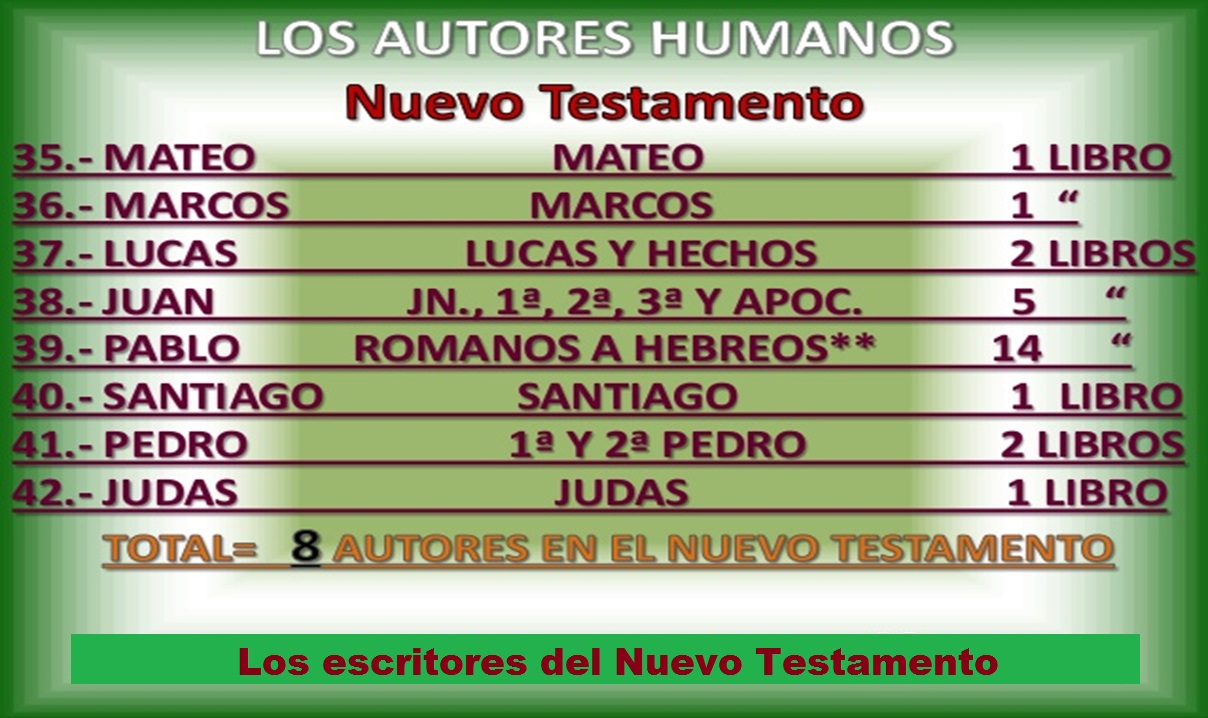For people who do not have the revelation of the word, it is normal for them to ask themselves:who is the author of the bible? However, the sacred writings give a faithful and unquestionable testimony of being the Word of God.

Who is the author of the Bible?
By historical tradition as well as by the affirmation of many scriptural scholars it is established that the Bible was written by men used by God. All the manuscripts that make up what is now the Bible were written over a millennium and a half years.
Manuscripts that were written by 36 men known by name plus the sons of Korah, as they are called in the scriptures. All these men collaborated in the sacred writings, the majority in the Old Testament and a few in the New Testament.
According to what has been found by scholars of the scriptures, some of the biblical texts were written by various scribes or authors. An example of this can be mentioned in the book of Psalms.
The book of Psalms the main collaborator was King David, but other psalms were also written by the sons of Korah, Moses, Ethan and Asaph. Later the names of these men will be detailed and what biblical texts of the Old or New Testament each of them wrote.
That said, there were several who wrote it, but: Who is the author of the Bible? For those who have the revelation of the word, they know that it has life. So it is not just any text, and therefore it cannot have any author either.
The definitive author of the Bible is God, because the word it contains is sharper than a two-edged sword:
Hebrews 4:12: Because the word of God is alive and effective, and sharper than any two-edged sword; and penetrates to the division of soul and spirit, joints and marrow, and discerns the thoughts and intentions of the heart.
The Bible is Inspired by God
The Bible is the instruction manual that God gives his children to teach them, correct them. In order that they grow and develop in them the perfect character of God and that of his son Christ Jesus, as can be read in:
2 Timothy 3:16-17 (NBV): 16 The entire Scripture is inspired by God and it is useful to teach us, to rebuke us, to correct us, and to show us how to lead a righteous life. 17 In this way, God's servants will be fully qualified to do good.
In this verse the Apostle Paul uses the Greek word theópneustos whose meaning is inspired, inspiration. This word is derived from the Greek root pneuma meaning breath, and is also the one commonly found in scripture as the Spirit (pneuma) of God.
Paul then makes reference that all writing is the divine breath of God, thus attributing the character that the Bible has of inscription. That is to say, to put in writing the divine revelation given to the authors inspired or used by God.
It can also be seen that it says: “the entire scripture”, that is, all of the Old and New Testaments. Understanding that all the verses from the first of Genesis to the last of the apocalypse are inscriptions from the breath or breath of God.
The literary producer of the Bible is God
As previously stated, the Bible is not just any text nor does it come from any author, Christians have this very clear by revelation of the Holy Spirit. Because for the believer the Bible is the living word of God printed in a book.
Through all the biblical texts, God expresses himself to the world, not only in the present but yesterday and tomorrow as well. In his word God reveals who he is and how his perfect work is, in his perfect love he corrects and fixes everything, leading everything to his perfect will.
God not only put his divine revelation in writing through the writers inspired or used by him, but also his word is alive. Everything in her is real, her writing style, her approaches, points of view, nature; all the word of him is discerned at any moment, time or circumstance.
That is why it is said that the universal word of God is alive and present from the book of Genesis to the revelation given by Jesus Christ to Saint John. None of his words has failed to come true so far and this is the most wonderful thing about God, that he is based on his word.
The supernatural of God is revealed by using so many men to shape his word, a word that transcends any language, culture and time.
The Bible is also a text that contains various styles of literature, but everything has a common message of love, redemption and transformation. Our heavenly Father has given us an instruction manual inspired by his Holy Spirit, the Bible.
Who is the author of the Bible?: Writers inspired by the Holy Spirit
This is how God inspired with his Holy Spirit all the men who wrote the Bible over fifteen hundred years. Throughout the Bible you can see the intrinsic relationship between what is human and what is divided, an example of this is the prophetic books, where the prophet speaks the word of Jehovah God.
So the Bible is fully human, fully divine, and fully inspired by the Spirit of God. To live it in the world that he himself created, and for which it was written.
The intrinsic relationship between the human and the divine is captured by the Apostle Peter in the second of his epistles:
2 Peter 1:19-21: 19 This makes the message of the prophets more certain, which you rightly take into account. Well, that message is like a lamp that shines in a dark place, until the day dawns and the morning star comes out to light your heart. 20 But first of all keep this in mind: that no prophecy of Scripture is something that one can interpret according to one's own eyes, 21 because the prophets never spoke on human initiative; on the contrary, they were men who spoke for God, led by the Holy Spirit.
Peter begins this passage by showing that what the prophets spoke in their times is a reliable and safe message. And then he continues, that such reliability is because the message is not born of some personal interpretation or some voluntary impulse of the prophet (the human); but this was carried by the Holy Spirit (the divine).
The Holy Spirit did not limit the freedom of the writers of the Bible
While it is true that God used men to write inspired or directed by the Holy Spirit his word. It is also true that he did not restrict or abridge the freedom of these biblical writers.
God left them with their own personalities and in some texts you can find the writer's own words, in his human part, describing his own experiences.
Luke 1:1-3: 1 Many have undertaken the task of writing the history of the deeds that God has accomplished among us, 2 as transmitted to us by those who from the beginning were eyewitnesses and then received the task of announcing the message. 3 I too, most excellent Theophilus, I have researched everything carefully from the beginning, and I found it convenient to write to you these things in order
Other examples of this are the words of Moses in the book of Deuteronomy, Luke in the book of the Acts of the apostles, the psalmists in their praises. In addition, the differences that can be found in terms of the style of literature between the writers.
Or the own appreciation of the facts as it happens with the synoptic gospels, of Mark, Matthew and Luke. Where the evangelists write about the same event that happened with Jesus, but each one tells it from his own perspective and style.
However, in all the writers of the Bible, the Holy Spirit of God was always present to direct and guide their minds in what they wrote. So that what they will capture is not just a simple human interpretation but the reliable word of God, or as the apostle Paul says: -The most secure and reliable prophetic word.
The human and the divine in the scriptures are inextricably linked, just as the scriptures are inseparable from Jesus. Because Christ is the Word of God incarnate, Revelation 19:13.
The prophets were messengers of God
The writers of the Bible and especially the Old Testament prophets were God's messengers. So that they will speak to the people of Israel in their name, bringing messages of hope and also the warning and wrath of God for their iniquities.
2 Chronicles 36:15: Jehovah, the God of their fathers, constantly sent warnings to them through his messengers, because he had mercy on his people and on his dwelling
The words used by the messengers of God were so reliable and accurately conveyed the divine intention, that what came out of the mouth of the prophet was called the word of God. Jesus himself in his time on earth quotes the words of Deuteronomy 8:3 in Matthew 4:4.
Deuteronomy 8:3: 3 He afflicted you and made you hungry and fed you with manna, food that neither you nor your fathers knew, to make you know that man shall not live on bread alone, but on everything what comes out of the mouth of the Lord man will live.
Learn even more about God's messengers in the article: The prophets: Who were they? Minors, majors and more. The Lord used these biblical characters as a way to authoritatively inform Israel about his Word.
Who is the author of the Bible?: The writers of the Old Testament
The Old Testament was the first testimony or the first writings of the Hebrew-Judaic culture. It covers everything that happened from creation to the incarnation of the envoy and son of God, Jesus Christ.
The writers used by God to print his words in the Old Testament were the following men:
- Moses writer of the five books of the Pentateuch (Genesis, Exodus, Leviticus, Numbers and Deuteronomy), in addition to the book of Job and Psalm 90.
- Joshua, write your own book.
- Samuel writes the book of judges, Ruth, and maybe 1 Samuel.
- David is the writer of most of the psalms.
- Asaf, write psalms number 50, 73 and 83.
- Psalms 42, 49, 84, 85, and 87 are attributed to the sons of Korah.
- Heman writes Psalm 88.
- Ethan writes Psalm 89.
- King Solomon is credited with Psalms 72 and 127, most of the chapters of the book of Proverbs, the books of Ecclesiastes and Songs.
- Agur is the writer of Proverbs 30.
- Lemuel writes chapter 31 of the book of Proverbs 31.
- Four writers are the major prophets: Isaiah, Ezekiel, Daniel, and Jeremiah. The latter also writes the book of Lamentations and may have collaborated with First and Second Kings.
- Twelve writers are the minor prophets: Hosea, Joel, Amos, Obadiah, Jonah, Micah, Nahum, Habakkuk, Zephaniah, Haggai, Zechariah, and Malachi.
- Ezra, writer of the book of Ezra, Nehemiah, first and second Chronicles.
We invite you to read an interesting article about one of the Old Testament books: books of samuel What we should know about the prophets! In it you will find what it means to have a life with God and the consequences of getting out of his way.
Who is the author of the Bible?: The writers of the New Testament
The New Testament contains the gospels, the message and the earthly ministry of Jesus, as well as Christian stories and doctrines embodied in various letters or epistles. All this information nurtured and formed the early communities of the Christian church.
The letters of the apostles Peter and Paul were inspired by the Spirit of God in order to spread the message of the gospel of Jesus to all corners of the world. The writers used by God in the New Testament were:
- Matthew, writer of the Gospel according to Saint Matthew
- Mark, writer of the gospel according to Saint Mark
- Luke, writer of the gospel according to Saint Luke and the book of Acts of the apostles.
- John, writer of his gospel, in addition to the first, second and third letters of John, as well as the book of revelation, the Apocalypse.
- The apostle Paul is the writer of 14 of the New Testament epistles.
- Peter the apostle of Jesus writes the first and second epistles of Peter.
- Santiago is the writer of the letter that bears his name.
- Judas writes the epistle of Saint Jude the apostle.
About who is the author of the Bible? I recommend you continue with the article: The book of joshua: Author, content, contributions, and much more. The book of Joshua is considered a historical book since it narrates what the people of Israel had to live on their way to the promised land, don't stop reading it!





